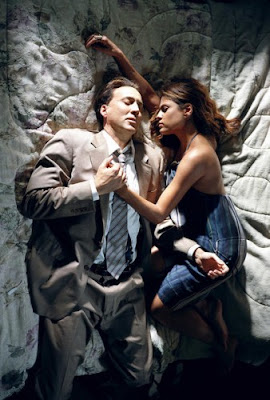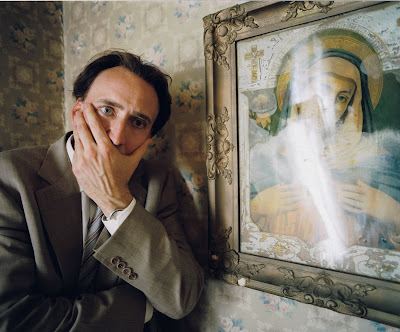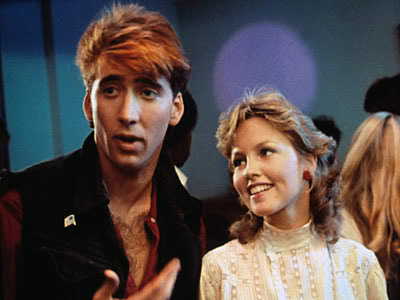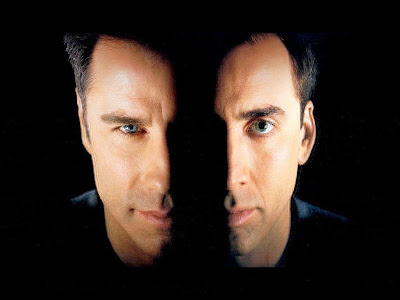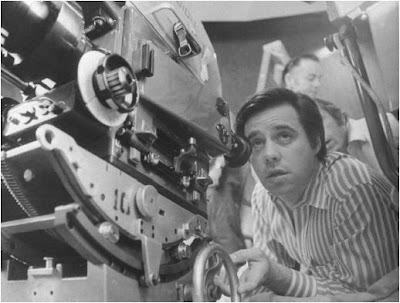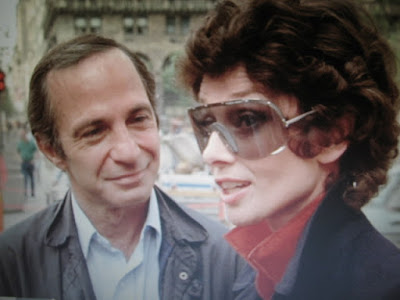 Actor Gary Oldman.
Actor Gary Oldman. GARY OLDMAN:
WORKING CLASS HERO
By
Alex Simon
Editor’s Note: This article originally appeared in the September 2000 issue of Venice Magazine.
Mel Gibson once said of actor Gary Oldman "He's kind of like Mr. Potato Head. It's like he has this ability to transform himself into something different at will." To the point, no other English-speaking actor since say, Dustin Hoffman, has donned such a wide variety of cinematic masks (including that of director) as the versatile, London-born Oldman. Born the youngest of three children, and the family's only boy, in the tough, blue collar section of South London in 1958, to a welder father and homemaker mother, Oldman endured a near-Dickensinian childhood. After his father left the family when Gary was seven, he managed to survive his formative years at a brutal boys' school, and won a scholarship to the Rose Buford College of Speech and Drama. Oldman's talent was spotted early, and his career on the London stage took off, followed by his film debut in 1986.
An actor of uncompromising intensity, commitment and range, Oldman blasted into the world's collective consciousness in his film debut as doomed punk rocker Sid Vicious in Alex Cox's visceral 1986 film Sid and Nancy. Oldman then played another British working class icon, with his masterful portrait of the flamboyant gay playwright Joe Orton in Prick Up Your Ears(1987). Memorable work followed in films such as Nicolas Roeg's Track 29(1988), Phil Joanu's State of Grace (1990), and Rosencrantz and Guildenstern(1990), but it was Oldman's turn as one of American history's most mysterious figures, Lee Harvey Oswald, in Oliver Stone's controversial JFK (1991) that firmly placed him on the map as one of world's greatest living actors. Blessed with an ability to inhabit the skin of the character he is playing, Oldman's work as Oswald, as well as turns playing such diverse figures as Bram Stoker's Dracula in Francis Coppola's 1992 film, and Beethoven in Immortal Beloved (1994), all give insight into people and/or characters previously thought inaccessible. Oldman's in-depth interpretations made these cultural icons all-too-human.
Other noteworthy performances include scene-stealing work in films like True Romance (1993, as a white, Rastafarian drug dealer), Luc Besson's The Professional (1994, as a drug-addicted crooked cop who listens to classical arias as he shotguns innocent families), and the blockbusters Air Force One (1997, as a terrorist leader),The Fifth Element (1997, as a wonderfully goofy intergalactic baddie who sounds as if he was raised in the bayous of Louisiana), and Lost in Space (1998, as the nefarious Dr. Smith).
Oldman made his writing/directing debut with the searing domestic drama Nil by Mouth (1997), about an abusive familial situation in Oldman's old stomping grounds of South London. The film was released to widespread critical acclaim on both sides of the Atlantic and revealed Oldman to be as gifted an artist behind the camera as he is in front.
Gary Oldman also has the distinction of being one of a handful of great actors for whom an Oscar nomination has proved elusive. That could all change with his latest film, The Contender. The Dream Works release is a riveting political drama, telling the story of Vice-Presidential nominee Laine Hansen (Joan Allen) who is put through a grueling confirmation hearing, led by one Senator Shelly Runyon (Oldman), a veteran politico who is determined that Hansen will not make it to the nation's number two office, especially when his staff uncovers a possible sexual indiscretion during her college years. Oldman's performance as Runyon is a deliciously layered, complex piece of work which the actor pulls off with panache. Oldman just wrapped work on Ridley Scott's Hannibal, the long-awaited sequel to Silence of the Lambs, in which he co-stars with Julianne Moore and Anthony Hopkins.
Just when the Oscar buzz for Oldman seemed like a sure thing, ugly rumors of internal strife on The Contender's set started to surface, highlighted by a controversial Premiere Magazine piece on the subject. What followed was a Rashomon-like series of allegations and accusations with writer-director Rod Lurie on one side, saying that Oldman, whom he calls "a conservative," suffered from "Stockholm Syndrome" and over-identified with his character, feeling that Runyon was the moral hero of the piece. On the other side are Oldman and manager/producing partner Douglas Urbanski, claiming that they were both quoted and interpreted out of context, including (according to the Premiere article) Oldman's accusation that DreamWorks re-cut the film to have a more liberal agenda. Oldman has long had a reputation as a man who speaks his mind and doesn't suffer fools. The actor sat down with Venice Magazine recently in Urbanski's West Hollywood offices to set the record straight, and to shed light on one of the most distinguished acting careers of his generation.
There seems to be a difference of opinion on how things transpired during the making of The Contender. Where should we start?
Gary Oldman: Well, (Rod Lurie) is something of a revisionist, really. All this talk of me suffering from "Stockholm Syndrome" with my character is ludicrous. It's one of Rod's theories that is based on nothing. If he were to get in the ring with me and go toe-to-toe on acting, who do you think knows more? He says these things, just runs off at the mouth. He said them when he was a critic. He said them in his film class. And he said them on the radio. You go 'You don't know what you're talking about.' One gets taken over by a character. Many years ago, Laurence Olivier was playing a character that he really didn't like. He was sort of standing outside the character looking at it, and was being sort of patronizing towards the character. And a good friend of Olivier's said to him "If you don't find something nice about this character, if you don't love this character, you will never be able to play him." If I stand in judgment of the characters I play, where does that leave me? There's a lot that Runyon does, that actually does make sense to me. I find a lot of that "Stockholm Syndrome" stuff really insulting, both to me and to actors in general. He doesn't know what he's talking about. I don't want to sit here and take cheap shots. This feud, this thing that has bubbled up, has become this sandstorm. I don't even know if it's interesting. It is odd that the word "conservative" has become the sort of politically-correct bad word to call someone. We've even had people call here and say "I didn't know Gary was a conservative," like they were saying I was a Communist. It's been really strange. I have never, politically or publically, claimed affiliation with any party. So this is just a story that got out there, maybe based on a few comments I made in the Premiere piece. And these things just have a way of spinning out of control. They talk about movies, and TV, and video games being the new kind of evil towards kids. It's replaced rock and roll, hasn't it? The Internet, I think, is a more insidious weapon, because it's like an expressway to the world. It's not just in one paper, one edition. If I'm misquoted in Premiere magazine, then a bastardized version gets out there, and the Daily Mirror are writing about it in England. Years ago, it was tomorrow's fish and chips paper. Now, it goes into the file. So this sandstorm that's been kicked up, it's all been a bit bemusing, and rather hurtful.
Let's start at the beginning. How did you see The Contender as story. How did you see your character Shelly Runyon, and what drew you to the project as a whole?
It's not only how I saw it. There was a creative team. Two of that team are myself (executive producer) and Doug Urbanski (co-producer). The other half was Rod Lurie and Marc Frydman (also a co-producer). If you're going to make a movie with anyone, you have to meet a lot, talk the thing to death, and you have to be on the same page. We never used the words "bad guys" or "villains" or "heroes." What was very interesting initially about the material was that ambiguity. We discussed with Rod the complexity of Runyon's character and that we had to be careful not to let Shelly Runyon twirl his mustache, so to speak. This indirectly brings us back to Rod's "Stockholm" comment and why I object to it so much. Firstly, an actor doesn't have to suffer from a psychotic disorder to be good. Second, the comment is saying that I'm out of control. Thirdly, I didn't invent any of this. Rod and I discussed Runyon. It was never black and white. Never good guys vs. bad. One could argue that (Jeff Bridges' character, the President) Jackson Evans is an egomaniacal man obsessed with food and ending his term with a controversial bang by appointing a woman. Runyon doesn't invent the sex scandal. If there's a weakness in his character, it's the (way he uses the) scandal. Instead of fighting her on the issues, i.e. abortion, her atheism, her wanting to ban handguns, and wanting a centralized, Orwellian government, he goes for the cheap shot. The turning point for me was the score. That was the big red flag for me. Everytime Runyon appears, there's this dark, sinister music playing. I believed it would contaminate the audience. The movie we discussed allowed the viewer to make up its mind. Now they're being told "This person's good, this person's bad." Music isn't Rod's forte and on viewing Deterrence (Lurie's directing debut) one of our big talking points going into The Contender was the music. We felt the music could be more quirky and witty, a bit like in Rushmore. The music playing at the end of The Contender now, you could put on the end of Hannibal because it's like horror movie music. The other disappointment was the poster and trailer adverting. The line reads "You can assassinate a leader without firing a shot." I thought I'd already made that movie. (laughs) I thought that was an obviously partisan shot, saying isn't that what happened to Clinton?
And you feel that the final product didn't reach the height you originally saw it reaching?
I liked an earlier cut that was more ambiguous and more loyal to what was originally on the page. That was not a four and-a-half hour cut, by the way, which I've also read somewhere. This also wasn't a longer cut with me in it more. (laughs) It was, I thought, an edgier, more ambiguous film.
Was there really as much internal strife happening as the Premiere piece would have you believe?
No, not at all. It was a really nice shoot. It was one of the nicest shoots that we've ever had. The beef with DreamWorks was never about The Contender itself, it was about something else, a contractual issue. There was some bad blood there for a couple of weeks and it got resolved. Let me make it clear that I'm a champion of DreamWorks. They picked up the movie and released it.
As the film is now, the version playing in theaters, how do you feel about it?
I feel good about it! I haven't seen it for a while. They were some changes made to it that I haven't seen. As producers you have two jobs: the first is to sort of chip away at the cut to make the film better and better. The second is to honor the director's vision and his cut. I always said that the notes we gave were suggestions. We never said, we were never in a position, where we were laying down the law. It's not a studio where they say "shoot this ending, or else." That's totally against our philosophy. On the one had we wanted to peck away at the film, on the other we wanted to honor Rod's cut. Making a film is not a democracy. There has to be one voice and one vision.
There's an amazing cast in this film. How was it working with them?
I think back on it with great affection. It was terrific. I loved Richmond, VA. We had a beautiful summer and they were all nice people. I don't have to talk about their work, because it speaks for itself, particularly in this movie. We all got along very well. We had a lot of laughs. We had fun making this film. It was a very nice experience that has, sadly, soured a little.
Let's talk about your background. You grew up in South London.
Yes. I have two older sisters. My mom was a housewife. My dad was a welder.
Were either of your parents artistic?
My mom sang. Still sings, given half the chance. My dad made models, like remote controlled boats and things, from scratch. He was an engineer in the Navy during the war. I have some letters, as well, that he wrote, which are quite beautiful. He was a real poet.
Were you always drawn to things creative?
Well, I was taken to the circus as a small boy and hated it. I remember screaming...and we left. (laughs) Never keen on pantomime, although we have that tradition. I loved movies. I also painted, and drew, and made models, and always off on my own doing something. The thing I do remember is that my mother had this wide white plastic belt like they had in the 60's. I put cigarette packs on it, painted it yellow, and it became my Batman utility belt! (laughs) I did things like that. I was always taking stuff and turning it into something else.
Was there one movie that did it for you?
Well I loved The Beatles. One of my sisters was like 16, 17 when that happened. And the first movie I saw was A Hard Day's Night(1964). She took me to see it in a cinema that is now a supermarket. My sister Jackie liked the movies a lot, and the ones that I could get into, she would sort of drag me along. I loved Hammer horror films when I was a kid, but of course, I was too young to see it. So what my sister would do, she'd go see Dracula with Christopher Lee, and she'd come back, and I'd make her tell me the whole movie! That was a given, that I made her promise she had to do! She'd say "Well, it starts with this belltower, and there's this blood dripping. Then this guy comes in..." and she'd describe it to me.
When did you know you wanted to act?
Well, it's an old story. I saw Malcolm McDowell in a movie called Raging Moon (aka Long Ago Tomorrow, 1970) and that was it. It was like a moment of clarity. 'This is it.' That was lightning bolt. You have to think, is there such a thing as a coincidence, or are things predestined? I knew that to get into drama school, I had to have a Shakespeare monologue and a modern monologue. Having never read any Shakespeare, I went to Fowles bookstore in the West End, to the drama section, and looked for books on speeches. I looked at the binders, and there was a book that said "Audition Speeches for Men." I opened it up, flicked through it, and came across the speech of Sloane, in (Joe Orton's) Entertaining Mister Sloane. And I read the speech, and I thought 'This is good.' Then I sought a guy out called Roger Williams, who was then the artistic director of the Greenwich Young People's Theater. I said 'I wanna go to drama school. I've got the modern speech, but I need a Shakespeare.' So he picked a speech from "Two Gentlemen of Verona."...So I got into to drama school, my education began, and I later played Sloane, and later played Joe Orton. Strange...
You made your film debut in Sid and Nancy (1986). All the characters you play you seem to embody, and seem to learn something about them. What did you learn from Sid Vicious?
If there's anything I learned from Sid, it was not to do heroin.
Did you have access to any of his friends or family for research?
I was able to speak with his mother, who was very helpful. That locket I wear in the film was actually his. She loaned it to me. I believe she committed suicide later. It was wonderful meeting her. It was sort of like being able to play John Cassavetes and having access to Gena Rowlands! (laughs)
Do you think even if he hadn't had access to drugs that he would have been doomed, regardless?
Probably, yeah. It would have been something else.
Do you think some people are born inherently self-destructive? That that's part of their genius?
I think there's a side to us all where some days we just get out of bed and want to smash it all to pieces and start again, full stop. You go to extremes because you just want the body to feel something. Whether it's sex, or booze, or drugs, or running, or weight-lifting. But self-destructive people, I think, are rarely born that way. I think their behavior is more the symptom of an event, or environment. I've been working on my own self for years, and my own self-worth, so I know what it feels like to have that side of Gary that is the self-destructive side. It does surprise me when we are shocked by someone in the entertainment industry breaking the law, or what would appear to be a moment of insanity or craziness. Why should we be shocked by that? Look what we do for a living! My son will take Lego bricks and take his little car and a stick from a lollipop, and create a world. He's at that age now, three, where the whole imagination starts to kick in. That's what I do. I just get paid for it. It's a very strange way of earning one's living: you go into work. You have to summon up emotions, because acting is feeling. I don't speak in absolutes, mind you. In my experience of two decades acting, I am convinced that it is not intellectual. First of all, it's concentration. And it is a sensation. It's a physical thing. You have to plug-in, or connect somewhere to stimulate the required emotion. Then at the end of the day, someone says "Cut. Wrap." and you're supposed to sort of go home and be all sort of nice and sane, and fluffy. And you've been invoking the spirit of your dead father all day, or whatever, to get to "the place." My analogy has always been that it's like a snowshaker. You go into work and shake this thing, and all these feelings and things come up. Then you're supposed to go home, have a beer, put your feet up and watch TV. The more I do it, the better I am at it go at the end of the day, the more capable I am of doing that. But there's a residue of something. It's a feeling, for Chrissakes. It doesn't surprise me all the problems Robert Downey, Jr. has had. He's fucking talented! He's an extremely talented man. I've never really met anyone in the arts who didn't have that side. The thing about Sid and Nancy is, it was a very depressing shoot. Now here's where something can get taken out of context. I say 'The shoot was depressing.' Then I read somewhere that I don't like (director) Alex Cox, or I didn't get on with (co-star) Chloe Webb. No. It was depressing, because you were in that head space every day for 17 weeks, and it bummed me out. But did I know I was acting? Yes. Did I think it was real? No. Was I suffering from "Stockholm Syndrome"? No.
Joe Orton was a fascinating character as well, also very self-destructive.
Joe, I'm sure, would have become a victim of AIDS, one of the first, had he not been murdered. People think "self-destructive" equals drugs and booze. Sex is another form of addiction that you can be very cavalier with.
You worked with the legendary Nicholas Roeg on Track 29. What was he like?
Adorable. I was still very young, green. I did Sid Vicious and Joe Orton back-to-back. There was no planning in that, there rarely is. So I made a bit of a splash with those. When I was working with Nic Roeg, he said "You're sort of the fair-haired boy of the moment, aren't you? Just wait, pretty soon they're going to want to see what you've got downstairs," and he sort of feigned a punch at my crotch. And he was right.
JFK had you playing Lee Harvey Oswald, arguably the most mysterious figure in American history. What did you learn about Oswald during the course of your portrayal?
We had that gun that he used. And I was up in the window of the book depository. It's not possible (that he made those shots). I'm not as paranoid as Oliver (Stone), but he's certainly on to something. Oswald probably was, in some capacity, set-up. There was something going on. There were too many coincidences and too many strange events. I mean, he's been a radar operator at an American air base in Japan for U-2 spy planes. He goes to Russia. He denounces his American citizenship. He meets this woman, marries her, then comes back at the height of the cold war, at the height of McCarthyism, when they were debriefing tourists who'd been there, and he got back in?! And they were like, "Oh, he slipped through our net." With that record?!
What about his psychology?
I think he was not too bright. Very keen, very idealistic, very naive. Easily manipulated. The set-up is, you look at the paper trail he left, he must've been told by others to do what he did. It was too perfect. It was almost like it was scripted. You can buy any gun over the counter, but he had to order that rifle so there was a paper trail to him. And actually it's not the gun that they found. The first gun was the Mauser, that then disappeared, then reappeared.
How was it working with Oliver Stone?
He's a force of nature. Brilliant. Self-destructive. He might want to watch that, curb that a bit. Great vision. Angry. Good. He's good. His energy is just enviable. A powerhouse. I had a great time working with him. Oliver saw me in State of Grace and that's what convinced him to cast me as Oswald. He said he saw an "intensity" and "haunted quality" in my character and wanted Oswald to have that same sort of withdrawn, haunted quality. I remember I was very isolated on that shoot, didn't hang out with anyone. I stayed in my hotel room on my own, ate on my own, walked around town on my own. There's a part of me that is that, a loner.
Isn't that a necessity in being a creative person, having time alone?
Yeah, but you have to get it from somewhere around you. You have to be living life. But if you're writing, or working on a character, there are pockets of concentration you need, where it helps to be alone, to have quiet. But you should never lose observation and imagination.
Francis Ford Coppola's Dracula was incredibly cinematic. Tell us about working with him.
Wonderful. A lot of rehearsal. We had four weeks of rehearsal. Coppola gives you room, gives you space, leaves you alone, really. It comes back to that thing of casting well and knowing when not to say something. Knowing when not to step in. Even though what an actor's doing might not be exactly your take on it, or you're not sure where they're going with it, you can't stifle the creative process. You have to let it breathe, then maybe later, come in and say 'Well, you're going off a bit there," or "Why don't you think about this?"
How long do you generally like to rehearse?
Oh, I could rehearse for years. There's something about the actual filming process that kind of gets in the way. It's like, do we have to film this? (laughs) This whole thing of making a movie in 28 or 30 days, maybe Sidney Lumet can do it, and God bless him, but the process is really hurt (by rushing)...I have a script now called Joe Buck that I spent a couple years writing that I'm now trying to raise money for. I have a certain process that I like to work with. And if I can't make my movie my way, I won't do it, as simple as that. "Can't you do it like this? Can't you do it like that? Can't you get him, he's a star? Do you really need that many days?" It's hard.
Drexel, your character in True Romance was a small part, but it's still one that people remember.
Yeah, they remember that and the "eggplant" scene, which was really like a short, wasn't it? It's like a one act play in itself. Very well-written. One of the few films I've made where you just shot what was there because the script was so good. The Contender had one or two little tweaks and re-writes, but it was more or less what was there, as well. Hannibal, which I've just done, was written by Steve Zaillian. Same thing.
I loved The Professional, and Leon, the European version, even more.
I was dating a girl at the time who had been a girlfriend of Luc (Besson)'s. He came to town and we met and he said "I have something for you, I think." He gave me the script and that was it.
How does he work with actors?
He tells you how to move, how to speak, where to stand. He tried that with me (laughs), not always with the greatest success. You have to be open to ideas, and it's okay if someone has a better idea than you. You can't nest and be so closed off. You act and direct with an open hand. It's about collaboration. There's one vision, ultimately. I am there to serve the director's vision, and I respect that. I'm not just going to stamp my foot and demand my own way. I'm going to go with the flow. If you come in open, you rasie the ceiling. You want an atmosphere where you can do your job. I'll offer up ten ideas, and I'll be lucky if the director uses one, but that's what I'm paid for, surely. The scene will only be as good as the director. If he's closed off, to the actor's creativity, then there's no surprise, and the scene will only be as good as the director.
In Immortal Beloved you gave a brilliant interpretation of Beethoven. What do you think made him tick?
Well, it was all about artistic control. He was like the Orson Welles and John Cassavetes of the music world. He wrote with passion. He wrote about feelings and emotions and he wrote what he wanted to write. Most of the work from that period was commissioned, because that's how you earned your money. It's hard to believe that most of what Mozart wrote were gigs! You listen to "The Requiem," and you can't believe that it was a commission! That he just sort of wrote it. But Beethoven wrote what he wanted to write.
Your writing/directing debut, Nil by Mouth, was a shattering portrait of the British working class experience. Tell us about its genesis.
Well the story is a fictional one, first of all. You work with thoughts, feelings, ideas. I guess my own upbringing. It's a film about codependency. It's a film about dependency. The idea for it had been swimming around for a long time. I always say that it took 35 years in development, and five weeks to write. It wasn't a desire to play with the toys, so to speak. There's no short film, no MTV videos. I shot it in the area where I grew up. It's a very matriarchal society. A lot of single moms. I don't like those men, although I'm completely fascinated by them, but I can't say I ever really was one of them. Growing up, my passport to manhood was booze. Once you got a certain age, you went to the pub. So I was around those men and my sister was married to a man who was a bit of Ray (the husband), although it's a thumbnail sketch. So I wanted to paint a portrait of that world, with the men at the pub talking nonsense and the women at home talking common sense and that represented them, without making fun of them.
I've been a fan of Ray Winstone, who played the husband, since Scum and Quadrophenia. What was he like?
Oliver Stone, ditto. (laughs) Please see the above! We called him "Hurricane Ray." Before I became an actor, I remember seeing Ray in Scum, had never worked with him, never met him and I was writing that character and had no face for him, really. I had a face, you know: red and puffy, and toxic. A toxic person. Then I thought, who could play this? Then I thought of Ray, with a few pounds on him.
His character in Scum could have been the same guy as a kid.
Yeah, absolutely. I sent it to his agent and, unlike here, he gave it to him immediately. He read it and called me back the next day and said "It's fucking brilliant. I'll do it." The next day!! Two days later I met him, and we talked about it. It's funny, you send stuff to people here and you just never hear back. Never even just a courtesy call saying they received it.
Any advice for first time directors?
(long pause) It's a hard one. I don't know if I can use myself as an example, because Nil by Mouth wasn't a piece of cake getting set up and getting financed, but being Gary Oldman the actor didn't hurt. At least you get into the room with the people. We're meeting people tonight for Joe Buck, who are meeting with us because I'm Gary Oldman, although that doesn't mean they'll give me the money. I'm a little more hard-nosed, because if I can't make Joe Buck the way I want, I won't do it. That's not necessarily great advice for everyone. We're all different. I believe the process is the process. It has to be respected. It takes time. I will not cast a star who's not right for the role just to get the film made. I will not change the dialogue, the language or the ending to get a rating. I have my own editing process, which is longer. I believe you should get your first cut together and then walk away from it. Don't look at it for four, five, six weeks. Ten weeks, even. Then look at it, and you'll learn a lot doing that. In my case, I saw Nil by Mouth after a break of two months, and I said, 'Well, it's a lot better than I remember it.' I also thought it was far too long, and you just see the woods from the trees. Some of the best writing and some of the best acting in Nil by Mouth isn't in the film, it's on the cutting room floor.
What I hear you saying is 'Be yourself.'
You've got to be yourself! It's all you have. Which brings us back full circle to what we started talking about. It's all about putting your head on the pillow at night and being able to sleep, retaining some degree of integrity and peace. That's what it's about, for me. John Cassavetes said it best: "To compromise an idea is to soften it, to betray it, to make an excuse for it." I think they are very wise words.












